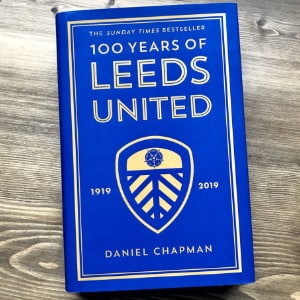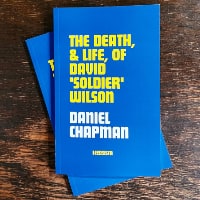Leeds United 0-2 Millwall: Your own heroics
Sometimes all the FA Cup becomes is a game against Millwall, again, too soon. But football matches still form their own entities and so the players picked to play could take to the pitch with heroics in mind.
Bless and thanks to Plymouth for the reminders of joy they brought to the FA Cup this weekend by stretching 44 league places and beating the best team in it. They larded the occasion with some rebukes to modern football, too, in the form of Wayne Rooney specifically, as their giantkilling of Liverpool FC was part of their recovery from the near-death experience of being managed by Wayne Rooney PLC. Even so, that's a reminder of an associated shame that the romance of the FA Cup no longer includes a plucky team being managed to success by one of England's all time greatest players, the sort of story that would have been a fairytale a few decades ago. Now, that guy's just a sucker, and it's been better for the FA Cup that he didn't last long enough at Argyle to be in it.
Discussion about precarious cup romance has replaced actual romance in the FA Cup but the folklore always obscured another side to the competition, amply narrated this weekend by Leeds United versus Millwall. Yes, people love all those giantkillings — Sunderland, Colchester, Bristol City, Histon, Sutton, and that's only against Leeds. But for every fairy story thrown up annually, there have always been hundreds of other ties being played in which absolutely nothing of interest happened at all except that it was winter and it was cold. The declining magic of the FA Cup has been told as a tale of venal interest in cash over heroics, but that's rose-tinted, as part of the allure of the Oldest Cup in the World was always that it offered the most Generous Gate Receipts Split in the Sport. The cancellation of replays this season has illuminated that it's not the corrupting influence of cash that has been ruining the FA Cup, but the declining opportunities for making significant money compared to league football. For every Plymouth Argyle team in history, celebrating their home win over a Liverpool, there were club directors trudging into the boardroom lamenting that Liverpool didn't get a late equaliser so they'd have a pay-day up at Anfield. Romance always came at a cost in somebody's book. The problem with the FA Cup, now, is that it's no longer worth enough.
So sometimes, like this time, all the FA Cup becomes is a game against Millwall, again, too soon since you played them last time and sooner than you wanted to play them again. And the talk about which players Daniel Farke should pick gets drawn out when really the decision was easy. It's not only that the league is more important for the long-term future of Leeds United as a club, as the financial implications of promotion to the Premier League — or not — have increased in significance due to rules around parachute payments and Profit & Sustainability regulations. But the disparity those rules have created between Premier League clubs and the rest means the Championship will be much easier to win than the cup. Not everyone can do a Plymouth against Liverpool, and it will be an incredible feat if Plymouth keep doing Plymouths until they win the final at Wembley. A league of your peers, especially when you're already top of it, is not such a daunting prospect and Leeds have fifteen cup finals to play there, starting in Watford on Tuesday night. It may be disrespectful to the history of the cup, but there is a hint of heroism still in this, in that Leeds are chasing the glory of a title and don't want to be distracted by the FA Cup's siren song of doom in the quarter-finals.

That's all about the team and the bigger picture. Football matches still form their own entities and so the players picked to play Millwall could take to the pitch with heroics in mind. Sam Chambers, a seventeen-year-old Leeds fan making his first start on the right wing, had two big chances to score. He must have made the cliché real, when he brought the ball down on his chest and volleyed just over, when he took a flick from Isaac Schmidt and after making room for a shot it was saved — the cliché about his eyes lighting up, sensing glory. He might have got glory too from some good crosses into the six yard box. Chambers was out there doing his best to write a story but even his carefree efforts couldn't crack the mood Millwall were enforcing on the game.
It may be that United's own players made this a glummer affair than it needed to be. The problem with so many changes — ten, and only Ethan Ampadu staying in from Wednesday — is that a team is replaced by a gang of individuals all with their own missions on their minds. Wilf Gnonto, who has been unable to get from the bench to starting on the wing, was given a go at Brenden Aaronson's job by playing at no.10. He couldn't work out where he was supposed to be and couldn't be effective, although he did replicate Rod Wallace's trademark rabbit-kick volleys with an effort in the first half that I enjoyed. Mateo Joseph, who should be basking as the main 'winner' of United's January transfer stillness, didn't do much to prove the club's case for not signing his replacement. With every touch he made the ball a balloon, and in the penalty area he had an unerring habit of running from the right place to the wrong one and missing the chance of a chance. Karl Darlow, in for maligned-until-midweek Illan Meslier, was beaten at his near post for Millwall's second and while he might be forgiven for a deflection, he stayed flat on his back staring at the sodden sky above him as if despairing how for all Meslier's big mistakes, he can't go a game in the team ahead of him without one of these more minor episodes descending from the clouds.
That goal wasn't really Darlow's fault, but Josuha Guilavogui's. He lost the ball while trying to control a simple pass in midfield and that let Femi Azeez run off and shoot at goal. Guilavogui also deflected the shot from which Azeez scored the first. And he played Ampadu into trouble just after that, leading to Azeez cracking the crossbar and Luke Cundle inexplicably putting the rebound wide. And he could have been sent off for a late lunge that took his studs right into Casper de Norre's ankle, where Josuha immediately knew they shouldn't be, and his general apologies beneath a yellow card were those of an old stager who can no longer time his own strength. Or control a midfield, which was a bigger problem for Leeds, as Joe Rothwell tried to keep things ticking around Guilavogui, who joined in occasionally with calm long-range distribution when he was given some time to think about it. Guilavogui isn't trying to claim a place in the Leeds team but he does still have something to prove because, at Thorp Arch, he has become regarded as a leader and an example to follow, setting the tone by training for each coming fixture as if he'll be playing a Champions League game, in Farke's view. The risk is that the other, more impressionable players might take a cynical view that all that training is for nothing if this is how he'll play.

Without turning this into a dirge, Isaac Schmidt was another who gave his game away with some finer details. The opening goal was arguably down to him as, instead of clearing from right-back, he and Gnonto made such a mess of trying to start a counter-attack that they both floundered and fell as Millwall ran through at now unguarded Ampadu. The inspiration for this had been a good bit of play by Schmidt earlier on, when he'd dribbled out of danger in his own box then chipped the ball forward to Gnonto. The despair of it was, after the goal, when Schmidt tried chipping forward from right-back again and put Leeds under pressure in a situation when, I bet you, Jayden Bogle would have had the nouse to bounce the ball off the nearby attacker and win a goal kick. As a decent player Schmidt looked decent but he was lacking a bit with the wits.
None of these things should be of much concern because players play better with better players, and Schmidt might do better as one addition to the first team, or Joseph might move better with Manor Solomon directing him, rather than Gnonto while he was also trying to work out what to do. The one worry for me was Ethan Ampadu, although it's only a thought about how he seems haunted this season by heroics. He came back after summer committed to righting the wrongs of last spring and the play-off final specifically. That was his fourth successive season of failure — relegation, relegation, relegation, play-off defeat, all despite how well he played — and he must be desperate to give his agent a positive reason for updating his Wikipedia page. That desperation combined with the captaincy made him something of a loose cannon in midfield at the start of the season when he was involving himself in too much off the ball and flying into too many tackles nearish the ball. He was only guilty in my eyes of trying too hard but was making himself less effective than, after his injury, the Ao Tanaka — Rothwell partnership of players who weren't here last year and weren't self-imposing such pressure. Perhaps pressure has built up in Ampadu while he's been injured and unable to contribute but his return has stayed scattergun. In the smooth running machinery of United's defence and midfield lately he's been a screeching cog that is not breaking but needs greasing. Daniel Farke says Ampadu is his most important player, and for his career this must be Ampadu's most important season, and 24 is young to be captaining Leeds United, and maybe his mind keeps replaying the 100th minute at Wembley when with one of the last chances to attack at his feet he scuffed the ball sideways and watched it bounce its desolate way across the field for a throw-in. Ampadu gripped his head with his hands right then and looks sometimes as if he's still gripping it now when, for the team's sake, he'd be better letting last season go.
We don't need a romantic lead star this season, or romantic stories in the cup, or individual heroics on a winter weekend. But we do need Ethan Ampadu to be as good as he really is. Perhaps Guilavogui's contribution this week, at Thorp Arch, can be teaching his teammates how to let the tension of a bad game go. ⭑彡